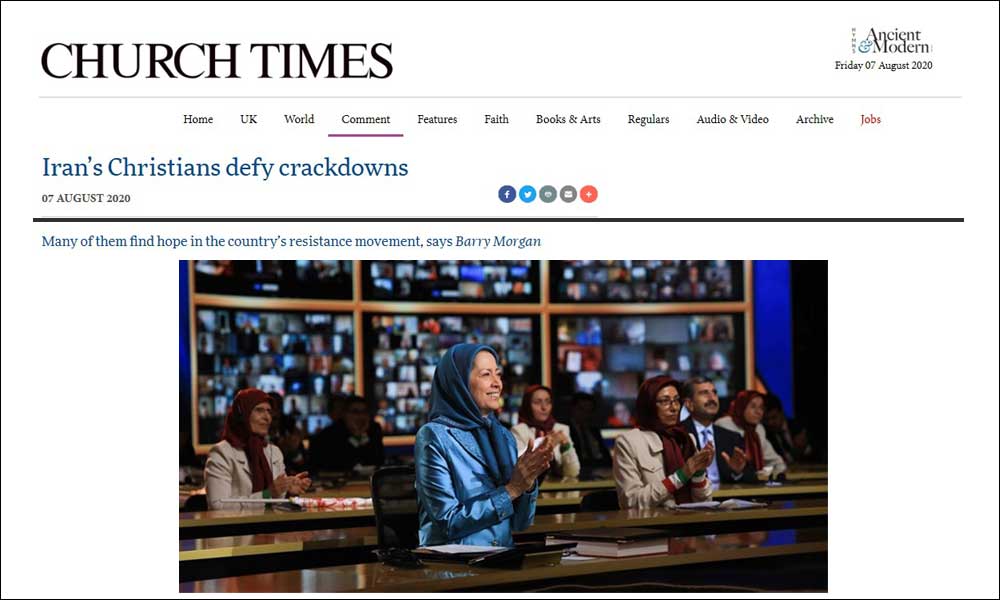Iran’s Christians defy crackdowns

Many of them find hope in the country’s resistance movement, says Barry Morgana
The Islamic Republic of Iran is the ninth least hospitable country for Christian religious minorities, according to the advocacy organisation Open Doors. Technically, Christianity is one of three non-Muslim faiths that are formally tolerated under the theocratic system. But the legal protections are limited, and apply only to those communities that had traditionally adhered to Christianity since before the 1979 revolution. Converting from Islam to any other religion is illegal in Iran, and is, in fact, punishable by death.
In recent years, Iranian authorities appear to have moved away from prosecuting Christian converts on charges such as apostasy. But, as with much of the clerical regime’s behavior, this shift seems designed to deflect international criticism rather than facilitate real reforms.
So, instead of explicitly charging Christians with practicing their faith, the Iranian judiciary has taken to accusing converts of coercing Iranian Muslims, in violation of the law.
In other cases, the regime appears content to rely on vague criminal charges, such as “acting against national security” or “enmity against God”, to secure convictions against members of religious minorities. These charges carry the death penalty. “Enmity against God” was used in the 1980s to initiate the mass execution of thousands of political prisoners, mainly targeting supporters and members of the People’s Mujahedin Organization of Iran (PMOI).
Amnesty International described the tragedy as a crime against humanity. It is easy to imagine a similar scheme targeting any other perceived threat to the Iranian regime’s ideological dominance or tenuous hold on power. Indeed, that is something that one can deduce from the regime’s move to accelerate its persecution of Christians.
THAT move seems to be motivated, in large part, by the steady growth in popularity of the Iranian “house-church” movement. Being barred from the public practice of their faith, converts from Islam to Christianity have formed networks of mutually supportive underground communities: private homes alternately play host to prayer gatherings and Bible study. The meetings are routinely subject to raids by the Iranian authorities, but this has not stopped them from reconvening, even when the threat of capital punishment looms over the community, as it does now, in the wake of changes to the penal code.
There is good reason to expect resilience to remain a notable feature of the house-church movement during these latest trials. Part of this resilience comes from the Christian faith itself. The other part is because of the tradition of perseverance grown among Iranians of various denominations struggling for freedom and democracy in their homeland. It was such perseverance that allowed the PMOI to grow in popularity and directly challenge the regime after the 1988 massacre.
That challenge has been expressed, for instance, in two nationwide uprisings: one in January 2018, and another in November 2019. Even the Supreme Leader of Iran acknowledged that the PMOI had played a leading part in organising those demonstrations and popularising their anti-government slogans. Ever since, he has been warning his supporters about the potential for more of the same unrest. The opposition group itself shared its outlook on that same potential when its representatives participated in the “Free Iran Global Summit” last month.
The annual event was hosted by the PMOI’s parent coalition, the National Council of Resistance of Iran (NCRI), and was held online because of the coronavirus pandemic. Iranians from 30,000 locations, both inside and outside Iran, participated in the event, despite the heightened risk of retaliation by the Iranian government. The keynote speaker was the President-elect of the NCRI, Maryam Rajavi.
I HAVE no doubt that Iranian Christians and those in the house-church movement participated in this event from inside their homes. After all, the alternative vision of the future of Iran laid out by the NCRI is one that safeguards the rights of minorities explicitly, and separates religion from the state while guaranteeing free and fair elections.
The event showed that the Iranian Resistance and the Iranian Christian community have been fighting for the same cause throughout the history of the Islamic Republic. The summit was an opportunity for both of them to recommit themselves to that fight. It was also a chance for those who support the Christians’ rights to see this united front.
Several Anglican bishops participated in the summit, too. The Rt Revd John Pritchard, a former Bishop of Oxford, announced the Statement on Iran initiated by the former Archbishop of Canterbury Lord Williams, and signed by nearly 40 serving and retired bishops from England, Wales, and Scotland (News, 17 July).
The statement urges the UK Government to put more diplomatic, political, and economic pressure on the regime to secure the immediate release of political prisoners and the dual nationals held unjustly in Iran. It also expresses support for Mrs Rajavi’s ten-point plan as a democratic platform for Iran in the future.
The platform stipulates: “Any form of discrimination against the followers of any religion and denomination will be prohibited,” and it “commits to the Universal Declaration of Human Rights, the UN Charter and other international covenants and conventions”.
The Rt Revd Dr Barry Morgan is a former Archbishop of Wales.

